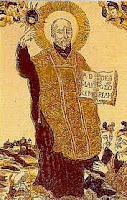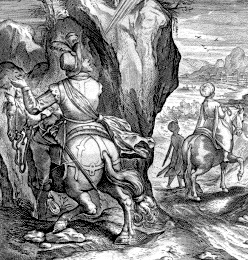EXAMINATION OF CONSCIENCE FOR PRIESTS
1. “It is for their sakes that I sanctify myself, so that they, too,
may be sanctified by the truth” (Jn 17:19).
Do I really take holiness seriously in my priesthood? Am I convinced that
the success of my priestly ministry comes from God and that, with the
grace of the Holy Spirit, I have to identify myself with Christ and give my
life for the salvation of the world?
2. “This is my body” (Mt 26:26).
Is the Holy Sacrifice of the Mass the centre of my spiritual life? Do I
prepare well to celebrate Mass? Do I devoutly celebrate the Mass? Do I
make an act of thanksgiving after Mass? Is the Mass the centre of my day
in giving thanks and praise to God for his blessings? Do I have recourse
to his goodness? Do I make reparation for my sins and for those of all
mankind?
3. “Zeal for your house consumes me” (Jn 2:17).
Do I celebrate the Holy Sacrifice of the Mass according to the rites and
rubrics established by the Church? Do I celebrate Holy Mass with a right
intention and according to the approved liturgical books? Am I attentive
to the sacred species conserved in the tabernacle and careful to renew it
periodically? Do I pay due attention to the sacred vessels and ensure their
conservation? Do I wear in a dignified fashion all of the sacred vestments
prescribed by the Church? Am I conscious that I act in persona
Christi Capitis?
4. “Remain in my love” (Jn 15:9).
Do I enjoy being in the presence of Christ in the Blessed Sacrament, in
meditation and in silent adoration? Am I faithful to the daily visit to the
Blessed Sacrament? Is the tabernacle my true treasure?
5. “Explain the parable to us” (Mt 13:36).
Do I carefully make a daily meditation and try to overcome all distractions
which separate me from God? Do I seek illumination from the Lord
whom I serve? Do I assiduously meditate on the Sacred Scriptures? Do I
carefully say my habitual prayers?
6. It is necessary “pray always and without tiring” (Lk 18:1)
Do I celebrate the Liturgy of the Hours every day in an integral,
dignified, attentive and devout manner? Am I faithful to my commitment to
Christ in this important aspect of my ministry, praying in
the name of the entire Church?
7. “Come and follow me” (Mt 19:21).
Is the Lord Jesus Christ the true love of my life? Do I joyfully observe
my commitment to love before God in celibate continence? Am I given
to impure thoughts, desires or actions? Do I indulge in improper conversation?
Have I allowed myself to be in the proximate occasion of
sin against chastity? Do I observe custody of the eyes? Have I been
prudent in my dealings with the various categories of persons? Does my
life represent for the faithful a true witness to the fact that holy purity is
possible, fruitful and joyful?
8. “Who are you?” (Jn 1:20).
In my daily life, am I weak, lazy or indolent? Do my conversations conform
to a sense of the natural and supernatural that a priest should have?
Am I careful to ensure that there are no elements of vanity or superficiality
in my life? Are all my actions consistent with my priestly state?
9. The Son of Man has nowhere to lay his head (Mt. 8:20).
Do I love Christian poverty? Does my heart belong to God? Am I spiritually
detached from everything else? Am I prepared to make sacrifices to
better serve God? Am I prepared to give up my comforts, personal plans,
and legitimate contacts, for God? Do I possess superfluous things? Do I
make unnecessary expenditure or am I taken over by consumerism? Do I
use my free time so as to be close to God remembering that I am always
a priest – even at these times of rest or vacation?
10. “You have hidden these things from the wise and learned and
revealed them to mere children” (Mt 11:25).
Am I guilty of the sins of pride: spiritual difficulties, susceptibility, irritation,
unwillingness to forgive, tendencies to despondency, etc.?
Do I ask God to give me the virtue of humility?
11. “And there fl owed out blood and water” (Jn 19:34).
Am I convinced that when I act “in the person of Christ” that I am
directly involved with the same Body of Christ, the Church? Can I sin
cerely say that I love the Church? Can I sincerely say that I strive with
joy for her growth? Am I concerned for her interests, those of all her
members and for the whole human race?
12. “You are Peter” (Mt 16:18).
Nihil sine Episcopo – nothing without the Bishop – was a saying of St
Ignatius of Antioch. Are these words at the root of my ministry? Do I
receive orders, counsels or correction from my Ordinary with docility?
Do I pray often for the Holy Father? Am I in full communion with his
teaching and intentions?
13. “Love one another” (Jn 13:34).
Have I been charitable in dealing with my brother priests? Does my egoism
leave me indifferent to them? Have I criticised my brother priests?
Have I supported those who are morally or physically ill? Am I committed
to fraternal action so that no one is ever left alone? Do I treat all
my brother priests and all of the laity with the charity and patience of
Christ?
14. “I am the way, the truth and the life” (Jn 14:6).
Is my knowledge of the teaching of the Church as comprehensive as it
should be? Do I assimilate and transmit her teachings? Am I conscious
that to teach something contrary to the Magisterium, solemn or ordinary,
is gravely abusive and causes damage to the faithful?
15. “Go and sin no more” (Jn 8:11).
Proclamation of the Word leads the faithful to the Sacraments. Do I
regularly go to Confession? Do I frequently go to Confession in accordance
with my state of life and because of the sacred things with which I
am involved? Do I generously celebrate the Sacrament of Penance? Am
I reasonably available to the faithful for spiritual direction and do I set
particular times aside for this purpose? Do I carefully prepare to instruct
in catechesis? Do I preach with zeal and with the love of God?
16. “He called those to himself whom he willed and these went with him” (Mk 3:13).
Am I careful to promote vocations to the priesthood and to the religious
life? Do I promote a greater awareness of the universal call to holiness
among the faithful? Do I encourage the faithful to pray for vocations and
for the sanctification of the clergy?
17. “The Man came not to be served but to serve” (Mt 20:28).
Have I sought to devote myself to others and serve them every day according
to the demands of the Gospel? Do I give witness to the Lord’s
charity by good works? Do I see the presence of Christ in the Cross and
do I see in it the triumph of love? Is my daily activity marked by a spirit
of service? Do I consider the exercise of authority as a form of service?
18. “I thirst” (Jn 19:28).
Have I prayed and generously made sacrifices for the good of the souls
entrusted to my care by God? Do I discharge my pastoral duties? Am I
solicitous for the Holy Souls?
19. Behold your son. Behold your mother (Jn 19: 26-27).
Do I entrust myself, full of hope, to the Blessed Virgin Mary, Mother of
Priests, through love and to love all the more her son Jesus Christ? Do
I practice Marian devotion? Do I say the Rosary every day? Do I have
recourse to her maternal intercession in my struggles with the devil,
concupiscence, and the world?
20. “Father, into your hands I commend my spirit” (Lk 23:44).
Am I solicitous in assisting and in administering the sacraments to the
dying? In my personal meditation, in catechesis and in my ordinary
preaching, do I give consideration to the Church’s teaching on the Last
Things? Do I ask for the grace of perseverance? Do I ask the faithful to
do likewise? Do I make frequent and devout suffrage for the souls of the
faithful departed?
Link (here) to
THE PRIEST, MINISTER OF DIVINE MERCY AN AID FOR CONFESSORS AND SPIRITUAL DIRECTORS
Issued by the Congregation for the Clergy
The Daily Examen of St. Ignatius of Loyola (here)




















